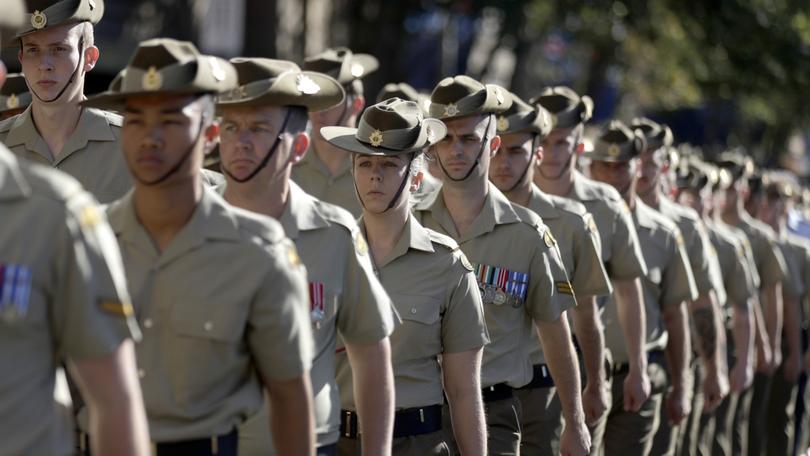Australia will need national service too, says prominent retired major general Mick Ryan
The current all-voluntary model of national service is inadequate to deter Chinese aggression, retired Australian Army major general Mick Ryan has warned.

The current all-voluntary model of national service is inadequate to deter Chinese aggression, retired Australian Army major general Mick Ryan has warned.
He claims that if Australia had to suddenly call upon its citizens to protect the country the outcome could be worse than Russia’s attempts to mobilise its society to fight in Ukraine.
He made the comments on the Bourke & Ryan podcast and before the UK’s Prime Minister Rishi Sunak announced he would bring back national service for 18-year-olds if re-elected.
Sign up to The Nightly's newsletters.
Get the first look at the digital newspaper, curated daily stories and breaking headlines delivered to your inbox.
By continuing you agree to our Terms and Privacy Policy.“Frankly, I don’t think the all-volunteer force is going to help us anymore,” he said.
“We need to have a large part of the force volunteer but smart countries like Sweden have already decided, listen, we need to also conscript people.
“They have some clever ways of doing it and the more we push back on that the harder it’s going to be to do when we have to do it.
“There is one hundred per cent certainty in the next decade, we’re going to have to mobilise people and industry in some kind of contingency.
“And the better prepared we are for that and the more honest we are with talking to our citizens and having the social licence for it, the more likely we are to not lose the next war.”
(Ret.) Maj. Gen. Ryan said that Australia’s island-status and geographical remoteness were not protection enough in and of themselves.
“There is a deep complacency in both politicians and citizens in Australia,” he said.
“We’ll probably be just as bad, if not worse than the Russians were in September 2022, at mobilising their people.
“I can’t see us doing a better job than that.”
He said the point about mobilising now was to show strength and prevent any escalation in conflict.
Already, China has conducted hostile acts against Australian navy divers and a helicopter pilot, in unprovoked incidents, prompting fears of an accidental spillover.
“If you’re smart and you invest in defence in a logical deterrence framework, including, at least plans for mobilisation, you might be able to deter someone from doing something which forces you to act under an existential threat,” Ryan said.
Australia ended conscription, which was used during the Vietnam War, in 1972 and the idea remains controversial.
A spokesman for Defence Minister Richard Marles said: “Conscription is not something the Albanese Government is considering.”
The spokesperson said the government was focused on improving recruitment and retention, “through widening the aperture to increase the opportunity for potentially suitable applicants to join the ADF” and offering retention initiatives.
The opposition’s defence spokesman Andrew Hastie has previously said the public would need to support the policy before conscription was ever reintroduced.
“It would be something that would have to be voted on in a plebiscite because the last thing a government wants is to be sort of press-ganging — to use the old language — press-ganging young Australians into uniform,” he said in a radio interview.
“You don’t get good soldiers, sailors or airmen that way.
“We want the whole country to be behind something like that and I think that would be something first discussed with the Australian people, a public debate and then probably something like a plebiscite to follow.”
Australia and the UK are alike in struggling to recruit and retain men and women to serve in the military.
This was also a problem Sweden faced triggering the reauthorisation of compulsory service as part of its Total Defence policy, whereby it asks all citizens aged between 16 and 70 to be prepared to contribute to the nation’s defences.
This can involve either military service, or civilian service such as working for the emergency services and general compulsory national service which only applies when the country is deemed under threat.
France reinstated national service in 2021 and a number of countries formerly occupied by Russia maintain compulsory training, including Estonia and Lithuania.
Denmark is expanding its scheme to include women.
Countries in the Indo-Pacific, such as South Korea also have compulsory military service.
During the pandemic, the country’s most high-profile football player and Tottenham Hotspurs captain Son Heung-min made headlines when he went home to complete his training when the Premier League was shut down and not even K-Pop stars were immune from the directive.
Mr Sunak is proposing that when a British person turns 18 they can serve in a role for one year or spend one weekend per month in a civic role, like delivering medicines.
